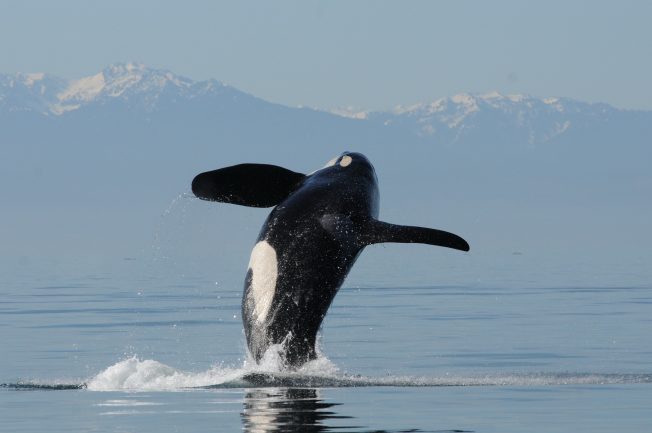
(Added: J34, photographed by Dave Ellifrit, Center for Whale Research)
9:22 AM: Heartbreaking news overnight for those who cherish our area’s endangered Southern Resident Killer Whales: Another one is gone. An orca found dead in Sechelt, B.C. [map] has been identified as J34, an 18-year-old male. CBC News and CTV News reports say the orca was spotted floating on Tuesday and brought to shore yesterday so a necropsy could be done.
Endangered killer whale found dead on B.C. coast https://t.co/g9knKT9hbf pic.twitter.com/U6nLwEEpbA
— CTV News (@CTVNews) December 22, 2016
No word yet on what has been found. Meanwhile, this tribute by the Orca Network puts the loss in context. An excerpt:
How to express this loss of beautiful young J34 Doublestuf? Of course we can only imagine how his mom J22 Oreo must feel from so much tragedy in her small matriline. In the mid 1990s the J10s were a bonded family with mom J10 Tahoma and big brother J18 Everett and sisters J20 Ewok and J22, always close. Then it started, with J20 dying in 1998, leaving her 2-year old J32 Rhapsody to be raised by younger sister J22, followed soon after by losing mom J10 in 1999, and a few months later big brother J18 washed up near Vancouver at 22 years old. J22 became mom and matriarch at that point. Just 2 years ago J32 and her unborn baby were found dead near Comox in Georgia Strait. And now, with J34 gone, only 31-year old J22 and her 13-year old son J38 Cookie remain. They need our help now more than ever.
Since the death of J1 Ruffles in 2010, J34 was often the most recognizable member of J pod, with his tall, slender, still gently curved dorsal fin with the telltale scallop midway in the trailing edge. …
The Center for Whale Research says J34 was seen alive in the San Juans just two weeks ago (a photo of him is in the slideshow on this page).
The last J Pod deaths were announced by whale advocates two months ago, when they summoned reporters to the downtown waterfront (WSB coverage here) to call for pressure on the federal government to breach Snake River dams that are contributing to a shortage of salmon, which is what the resident orcas eat. Even before J34’s death was announced, the Orca Network was planning a candlelight vigil for the SRKWs for December 27th at the Langley Whale Center on Whidbey Island (where ON is based).
11:47 AM: The Center for Whale Research has just sent its news release about J34’s death:
We regret having to make a distressing announcement during this holiday season, but we confirm from news photographs and eyepatch photos sent to the Center for Whale Research that the killer whale carcass that was towed to a beach near Sechelt on the BC Sunshine coast is indeed that of J34, an eighteen-year-old male in the iconic J pod of the endangered Southern Resident Killer Whale population. The carcass was observed floating near shore on Tuesday, December 20th 2016 and was recovered by coast guard personnel and Sechelt First Nation members.
We are awaiting the results of a necropsy conducted late Wednesday by the Canadian Department of Fisheries and Oceans (DFO) for an official report of J34’s body condition and cause of death. We reported that J34 was looking skinny this past summer.
At least four other J pod members have died so far in 2016: J55 in January, J14 in July, and a mother and calf J28 and J54 in October.
J34’s eighteen-year-old cousin, J32, died from birthing complications and emaciation in December 2014 and her necropsy report was released to the public in April 2016.
For over a decade, we have been voicing concern that these whales are not getting sufficient salmon for their survival and that all fisheries management options should be considered including catch limits and strategic dam removal to recover endangered wild salmon populations. However, a blue-ribbon panel of experts assembled by DFO and NOAA Fisheries concluded in 2012 that they were: “skeptical that reduced Chinook salmon harvesting would have a large impact on the abundance of Chinook salmon available to SRKW.”
However, in May 2016 Federal District Court Judge Michael D. Simon rejected the status quo on dam operations on the Columbia and Snake Rivers and called for an extensive National Environmental Policy Act (NEPA) review to determine dam related impacts to federally endangered salmon in the Columbia basin – salmon that are vital to the Southern Resident killer whales in coastal waters during the winter months and when they do not find sufficient food in the Salish Sea during the rest of the year.
Assuming no other whales are missing, J pod now has 25 members, K pod 19 members, and L pod 35 members.
Total SRKW population 79, but this number is obviously subject to change with births and deaths at any time.
CWR also released photos of J34, and we have added one atop this story.
ADDED MONDAY NIGHT: Early necropsy results show J34 died of “blunt force trauma,” possibly the result of a ship strike.
.

| 16 COMMENTS